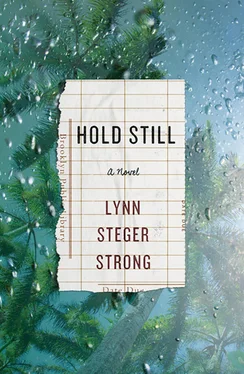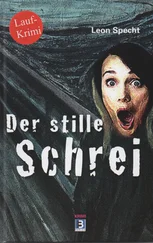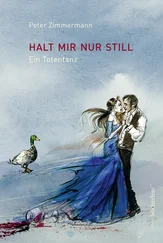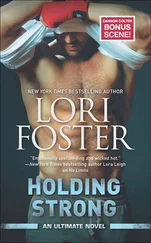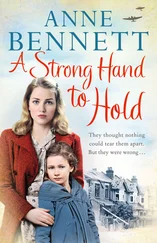“I think they figure the sicker I am, the better, you know? If whatever’s wrong with me is really bad, then when I’m finally fixed, I’ll be that much closer to the person they wish I was.”
Across the creek, something slithered in and under. They heard what might have been the slap of a heavy scaly tail.
“For a while, I had headaches,” Maya said. “I don’t remember how I did it. I think one day I mentioned my head hurt. You know, in the way thirteen-year-old girls mention things.” Of course, it hadn’t been so long ago for either of them that they’d been thirteen. “And my dad got worried, I guess. He wanted me to see specialists. He loved projects; he could find the newest, the best, the farthest away. He took me to a friend of a friend’s doctor who’d been recommended and they’d ask how much does it hurt, when, where. They would ask me to describe in detail the extent of the pain. And I started to get confused if I’d ever felt anything, you know? They would show me that pain scale, with the ten faces that represent different gradations of pain. I almost always picked the middle one.” She looked over at Annie, who had grabbed the wine and refilled her glass. She handed the bottle to Maya, who then did the same. “We went to acupuncturists and therapists. He got me this bed with magnets in it that was supposed to help. And every time, I would search for some vaguely appropriate approximation of the pain. It never felt like lying, really, but it was all basically made up. No one ever found anything. It was just the thing we did for a while: we went to doctors and they took pictures of and asked questions about my brain. He’d ask me sometimes, years later. But I don’t know, you know? I’ve always had a hard time figuring out what’s real and what’s just in my head.”
“You think I’m making it up?”
Maya stared at Annie. She’d somehow gone off track. “Of course not,” she said. She reached toward her, held her shoulder. “I’m sorry. I was just — I was trying to tell you, it’s weird, you know? The way people love and try to understand all our different versions of not-rightness. I don’t think it makes much sense most of the time.”
When Maya finally left a few months later, it was summer, before classes started. She was antsy in Florida, ready for the city — the water only worked on her for finite bits of time. Annie came to the house and cried and helped her pack. They would talk always after that. Sometimes months would pass. Sometimes they wouldn’t see one another for years. But they were constants for one another, when neither of them had had much constant before that.
“I reconciled myself to not having a mother a long time ago,” says Annie. Maya’s hardly moved since she picked up the phone. It’s snowing outside Ellie’s window, tiny blustery flakes. “Long before my actual mom died,” Annie says. “I figured most people had it a lot worse than me. She just wasn’t the type to nurture. And when I thought of a person that I could count on for those sorts of phone calls, I always thought of you. I liked that we’d chosen one another, that we could be peers as well as whatever we’d started as. But I don’t know. I guess there are things that connect us to the people who gave birth to us, to the people that we gave birth to.” She stops a minute. Maya chokes back a sob.
“I’m not going to pursue charges, Maya. I don’t want her to be locked up her whole life.” Maya’s knuckles ache, they hold so tightly to her phone. “She didn’t. .” Annie says. “We’re all culpable, Maya, you and me much more than her.”
Ellie’s last day in New York, she comes home to the sound of her mom in her office, rifling through papers, doing whatever it is she does with all her books. She thinks of listening to the lock turn when she and Ben were small. It’s an old door. There was no mistaking the sound of the large bolt creaking. And they all had to pretend their mom hadn’t done it on purpose, that she wasn’t terrified suddenly of her own kids. Sometimes, when their dad was home, when Ben and Ellie were upstairs and he didn’t think that they could hear him, he would yell straight through the door. He’d hiss awful things at her. “You pathetic child,” he’d say. “What the fuck is wrong with you?” They never heard the things their mom said back to him. Though Ellie guessed that she was silent. Whatever her mom felt or thought, she pulled it in, like Ellie, rather than throw it back out into the world.
“El.”
She jumps. They’ve hardly spoken since the trip was scheduled. Ellie has a plane ticket for the next morning. She still can’t believe how quickly her mom has managed to do away with her.
“Come in here?” her mother says.
Ellie stays still at the threshold of her mom’s office. She looks at all the shelves, full to overflowing, the papers a mess over her desk.
Her mom turns her chair so that she’s facing Ellie. Ellie looks along the shelves, then briefly at her mom. She is only accidentally pretty, Ellie’s mother. She wears her hair pulled back most of the time and hardly any makeup. A lot of the time, she sort of looks just like a mom. She looks tired and her skin is worn from all that sun she got growing up in Florida, the hours she spends running almost every day all year. But then Ellie will catch her from a certain angle, she’ll be smiling just a little, or her nose will scrunch in approval, usually over something Benny says, and Ellie will think she has a very lovely mother, she’ll wish they were the sort of mom and daughter that she could tell her this.
“When you were really little,” her mom says. She crosses her arms over her chest.
Ellie wants to stop her. She doesn’t want some lesson or consolation. But when she turns to see her mom’s face, looking straight ahead and tight from jaw to temple, she stays quiet and lets her talk. “When you were just born,” her mom says. “You slept every night on my chest for months.” Her mom smiles, looking down into her shirt. “Just your skin and my skin and that tiny diaper. I thought everything good in the whole world had something to do with what it felt like to hold you like that.” Ellie’s not sure she wants to hear this. She’s not sure where to fit it in with all her other thoughts about her mom. “But then, you know, you got bigger and your dad was going a little crazy with you in the bed every night. I wasn’t really sleeping. And someone told us.” She feels her mom smile again. “It’s amazing how easily we took advice from almost anyone. It felt like the whole world must know more about how to parent than we did. But someone told us wherever you were at five to six months, wherever you were sleeping, was where you’d be your whole childhood, so I agreed to move you to the crib.” Her mom has a rounder nose and her eyes are smaller than Ellie’s. But they’re the exact same color, dark with tiny flecks of green around the edge. She shakes her head again, looks down. “The idea of being away from you, of not feeling you breathing every night, it scared me,” her mom says. Ellie doesn’t mean to, but she laughs and looks at her. Both of them smile shyly. Ellie looks back down at her boots. “I got up at night six or seven times. Sometimes I never slept. I must have, but I don’t remember any sleep. I’d just sit in your room on this little stool I brought from the kitchen and watch your chest move. You were so tiny still. Sometimes I’d place my hand on your chest just to be sure.” Her mom shakes her head. “Anyway.” She grabs a book off of her desk, then sets it down. “Your dad was worried that I wasn’t sleeping. You know, I wasn’t being productive at work , I’m sure.” She stops. Ellie watches as she turns from this thought of her dad back to her. “So, the next appointment with the doctor, he comes and tells him what I’m doing.” Her mom’s shoulders tense and she takes hold of both sides of her chair, leaning forward. She looks at her daughter. “I was so angry, you know? Like he’d betrayed me somehow. Like no one on earth could understand this need I felt to be sure every second that you stayed alive. And I’d been unsure of the doctor to begin with. I wanted a woman. I wanted only to be surrounded by women after you were born. But he was a good guy. He’d been dealing with new mothers for many, many years. I remember he touched me. It was somehow exactly as he should. He held my arm in this extremely paternal way. I was so young then.” Her mom’s shoulders curve so that her chin comes toward her chest, but she raises her eyes, still looking at her. “I was twenty-eight. Which must have felt old then. But with him holding my arm and me close to tears with fear, he said, very firmly, but very simply, ‘They want to live.’”
Читать дальше
